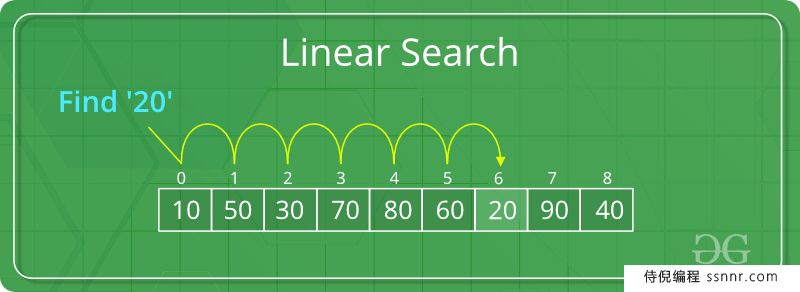C++ 程序 线性搜索
问题: 给定一个由 n 个元素组成的数组 arr[],编写一个函数在 arr[] 中搜索给定的元素 x。
例子:
输入: arr[] = {10, 20, 80, 30, 60, 50,
110, 100, 130, 170}
x = 110;
输出: 6
元素 x 存在于索引 6 处
输入: arr[] = {10, 20, 80, 30, 60, 50,
110, 100, 130, 170}
x = 175;
输出: -1
元素 x 不存在于 arr[] 中。
一个简单的方法是 线性搜索 ,即
- 从 arr[] 的最左边的元素开始,逐个与 arr[] 中的每个元素进行比较
- 如果 x 与某个元素匹配,则返回该索引。
- 如果 x 与任何元素都不匹配,则返回 -1。

例子:
// C++ 程序进行线性搜索
// 在 arr[] 中查找 x。
// 如果 x 存在,则返回其位置,
// 否则返回 -1。
#include <iostream>
using namespace std;
int search(int arr[],
int n, int x)
{
int i;
for (i = 0; i < n; i++)
if (arr[i] == x)
return i;
return -1;
}
// 驱动程序
int main(void)
{
int arr[] = {2, 3, 4, 10, 40};
int x = 10;
int n = sizeof(arr) / sizeof(arr[0]);
// 调用函数
int result = search(arr, n, x);
(result == -1) ?
cout << "元素不存在于数组中" :
cout << "元素存在于索引 " <<
result;
return 0;
}
输出
元素存在于索引 3
上述算法的 时间复杂度 为 O(n)。
上述算法的 空间复杂度 为 O(1),因为没有使用额外的空间。
线性搜索在实际中很少使用,因为其他搜索算法,如二进制搜索算法和哈希表,允许与线性搜索相比更快的搜索速度。
改善线性搜索的最坏时间复杂度
- 如果元素在最后找到,则 O(n) 到 O(1)
- 这与之前的方法相同,因为在此处我们在一次循环的迭代中执行了 2 个“if”操作,而在先前的方法中,我们仅执行了 1 个“if”操作。这使两个时间复杂度相同。
下面是实现代码:
// C++程序用于线性搜索
#include<bits/stdc++.h>
using namespace std;
void search(vector<int> arr,
int search_Element)
{
int left = 0;
int length = arr.size();
int position = -1;
int right = length - 1;
// 从0到right循环
for(left = 0; left <= right;)
{
// 如果左边找到了search_element
if (arr[left] == search_Element)
{
position = left;
cout << "在数组中找到元素位置为 " <<
position + 1 << " 尝试 " <<
left + 1;
break;
}
// 如果右边找到了search_element
if (arr[right] == search_Element)
{
position = right;
cout << "在数组中找到元素位置为 " <<
position + 1 << " 尝试 " <<
length - right;
break;
}
left++;
right--;
}
// 如果没有找到元素
if (position == -1)
cout << "在数组中未找到元素,尝试次数为 "
<< left;
}
// 主程序
int main()
{
vector<int> arr{1, 2, 3, 4, 5};
int search_element = 5;
// 调用函数
search(arr, search_element);
}
// 鸣谢:mayanktyagi1709```
输出
在数组中找到元素位置为 5 尝试 1
时间复杂度: O(n)
辅助空间: O(1)
版权声明:本页面内容旨在传播知识,为用户自行发布,若有侵权等问题请及时与本网联系,我们将第一时间处理。E-mail:284563525@qq.com




